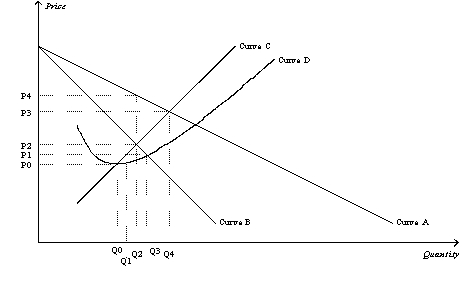B) False
Correct Answer

verified
Correct Answer
verified
Multiple Choice
The collection of statutes aimed at curbing monopoly power is called
A) the 14th amendment.
B) the Clayton Act.
C) the Sherman Act.
D) antitrust law.
F) A) and C)
Correct Answer

verified
Correct Answer
verified
True/False
Some companies merge in order to lower costs through efficient joint production.
B) False
Correct Answer

verified
Correct Answer
verified
Multiple Choice
Which of the following formulas would correctly calculate a monopolist's profit?
A) profit = price - marginal cost
B) profit = price - average total cost
C) profit = (price - marginal cost) * quantity
D) profit = (price - average total cost) * quantity
F) All of the above
Correct Answer

verified
Correct Answer
verified
Multiple Choice
During the holiday season,high-end retailers frequently place a high price on merchandise on weekends and discount the price during the week.They do this because they believe that two groups of customers exist: shoppers with little free time and bargain hunters.Bargain hunters have time to shop around and frequently shop during the week.What do economists call this price strategy used by high-end retailers?
A) oligopoly
B) price discrimination
C) compensating differential
D) in-kind transfers
F) All of the above
Correct Answer

verified
Correct Answer
verified
Multiple Choice
Which of the following is not an example of a barrier to entry?
A) Mighty Mitch's Mining Company owns a unique plot of land in Tanzania, under which lies the only large deposit of Tanzanite in the world.
B) A college student starts a part-time tutoring business.
C) A novelist obtains a copyright for her new book.
D) A taxi cab driver in New York City obtains a license to legally provide transportation in New York City.
F) A) and B)
Correct Answer

verified
Correct Answer
verified
Multiple Choice
Monopolies are inefficient because they (i) eliminate barriers to entry. (ii) price their product at a level where marginal revenue exceeds marginal cost. (iii) restrict output below the socially efficient level of production.
A) (i) and (ii) only
B) (ii) and (iii) only
C) (iii) only
D) (i) , (ii) , and (iii)
F) B) and D)
Correct Answer

verified
Correct Answer
verified
Multiple Choice
Which of the following is an example of public ownership of a monopoly?
A) DeBeers
B) Microsoft
C) U.S. Postal Service
D) AT&T
F) A) and B)
Correct Answer

verified
Correct Answer
verified
Multiple Choice
If a monopolist's marginal costs increase by $1 for all levels of output,then the monopoly price will
A) rise by $1.
B) rise by more than $1.
C) rise by less than $1.
D) not change, but profits will decrease.
F) C) and D)
Correct Answer

verified
Correct Answer
verified
Multiple Choice
A monopolist produces
A) more than the socially efficient quantity of output but at a higher price than in a competitive market.
B) less than the socially efficient quantity of output but at a higher price than in a competitive market.
C) the socially efficient quantity of output but at a higher price than in a competitive market.
D) possibly more or possibly less than the socially efficient quantity of output, but definitely at a higher price than in a competitive market.
F) B) and C)
Correct Answer

verified
Correct Answer
verified
True/False
Copyrights and patents are examples of barriers to entry that give firms monopoly pricing powers.
B) False
Correct Answer

verified
Correct Answer
verified
Multiple Choice
Which of the following statements is not correct?
A) Two examples of early antitrust laws are the Sherman and Clayton Antitrust Acts.
B) Antitrust laws automatically prevent mergers between companies that produce similar products.
C) Antitrust laws give the government power to increase competition.
D) Antitrust laws can reduce social welfare if they prevent mergers that would lower costs through more efficient joint production.
F) B) and D)
Correct Answer

verified
Correct Answer
verified
Multiple Choice
Which of the following statements is correct for both a monopolist and a perfectly competitive firm? i) The firm maximizes profits by equating marginal revenue with marginal cost. Ii) The firm maximizes profits by equating price with marginal cost. Iii) Demand equals marginal revenue. Iv) Average revenue equals price.
A) i) , iii) , and iv) only
B) i) and iv) only
C) i) , ii) , and iv) only
D) i) , ii) , iii) , and iv)
F) B) and C)
Correct Answer

verified
Correct Answer
verified
Multiple Choice
If a monopolist can sell 7 units when the price is $4 and 8 units when the price is $3,then marginal revenue of selling the eighth unit is equal to
A) $3.
B) $4.
C) $24.
D) -$4.
F) B) and D)
Correct Answer

verified
Correct Answer
verified
Multiple Choice
Which of the following strategies is not an effective strategy to reduce monopoly inefficiency?
A) antitrust laws
B) price discrimination
C) doing nothing
D) breaking up a natural monopoly into more than one firm
F) A) and D)
Correct Answer

verified
Correct Answer
verified
Multiple Choice
Suppose a monopolist charges a price of $27 for its product and sells 10 units at that price.At 10 units of production the firm has average fixed cost equal to $10 and average variable cost equal to $12.How much total profit is the firm earning at this price?
A) $5
B) $25
C) $50
D) $140
F) None of the above
Correct Answer

verified
Correct Answer
verified
Multiple Choice
Figure 15-3
 -Refer to Figure 15-3.If the monopoly firm wants to maximize its profit,it should operate at a level of output equal to
-Refer to Figure 15-3.If the monopoly firm wants to maximize its profit,it should operate at a level of output equal to
A) Q1.
B) Q2.
C) Q3.
D) Q4.
F) All of the above
Correct Answer

verified
Correct Answer
verified
Multiple Choice
When the government creates a monopoly,the social loss may include
A) declining marginal costs.
B) the cost of lawyers and lobbyists hired to convince lawmakers to continue the monopoly.
C) excessive monopoly profits.
D) diminishing marginal revenue.
F) B) and D)
Correct Answer

verified
Correct Answer
verified
Multiple Choice
Scenario 15-6 The concert promoters of a heavy-metal band, WeR2Loud, know that there are two types of concert-goers: die-hard fans and casual fans. For a particular WeR2Loud concert, there are 1,000 die-hard fans who will pay $150 for a ticket and 500 casual fans who will pay $50 for a ticket. There are 1,500 seats available at the concert venue. Suppose the cost of putting on the concert is $50,000, which includes the cost of the band, lighting, security, etc. -Refer to Scenario 15-6.How much profit will the concert promoters earn if they set the price of each ticket at $150?
A) $75,000
B) $100,000
C) $150,000
D) $175,000
F) A) and C)
Correct Answer

verified
Correct Answer
verified
Multiple Choice
Table 15-7
Sally owns the only shoe store in town. She has the following cost and revenue information.
 -Refer to Table 15-7.What is the total variable cost of production when Sally produces six pairs of shoes?
-Refer to Table 15-7.What is the total variable cost of production when Sally produces six pairs of shoes?
A) $100
B) $295
C) $600
D) $620
F) A) and D)
Correct Answer

verified
Correct Answer
verified
Showing 221 - 240 of 526
Related Exams